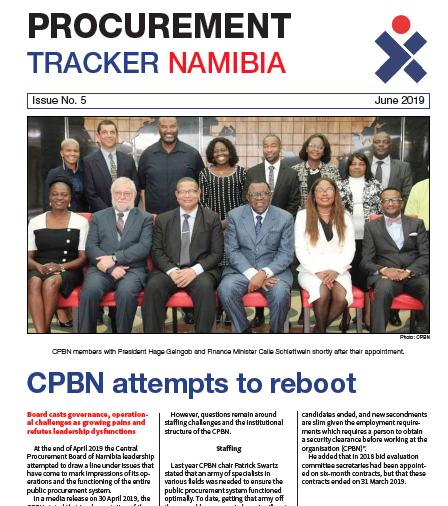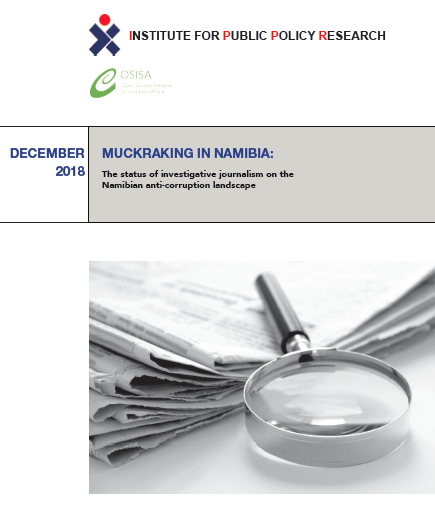Public Procurement Tracker Namibia

Recent statements by senior government figures indicate that the problems that have been experienced with the implementation of the Public Procurement Act since 2017 can no longer simply be described as ‘growing pains’. The latest edition of our Procurement Tracker bulletin examines these recent pronouncements on the faults and gaps in the present system as […]
Public Procurement Tracker Namibia

Our latest public procurement bulletin examines the capacity issues facing the Central Procurement Board of Namibia, proposed amendments to the procurement legislation, and continuing issues around the lack of transparency about public procurement decisions
5% of corruption cases finalised since 2006
Out of the 6 605 corruption reports registered with the Anti-Corruption Commission (ACC) since its inception in 2006, only 347 have been finalised in the courts.
A total of 605 cases have been submitted to the prosecutor-general (PG) for a decision. Of this figure, 212 cases are still pending trial, while 24 are pending the PG’s decision.
This leaves much to be desired in the anti-graft fight, according to ACC’s director-general, Paulus Noa.
IPPR director Graham Hopwood on International Anti-corruption Day 2018
@ipprnamibia director Graham Hopwood spoke about ‘pillars’ in the anti-corruption fight at an event on Friday, 7 December, to mark International Anti-corruption Day 2018 which fell on Sunday, 9 December 2018, under the theme #UnitedAgainstCorruption. Video: Sakeus Iikela
Creaking Under Its Own Weight

Bottlenecks and backlogs continue to undermine the delivery of justice in Namibia – thereby fuelling negative perceptions of the rule of law and the effectiveness of the criminal justice system. Efforts over recent years to introduce case management systems and speed up the handling of cases appear to have only had a minimal effect. Many […]
Muckraking in Namibia

Investigative journalism shines a light of accountability on those who seek to commit acts of corruption under a shroud of secrecy. Yet, investigative journalism cannot play a meaningful role in reducing corruption unless it is properly funded and supported. In Namibia, the pressures of producing daily newspapers can mean there is a lack of resources […]
IPPR corruption report not factual – ICT Minister
Government is unhappy over what it calls a misleading statement made by the Institute for Public Policy and Research (IPPR).
The IPPR reported that politicians and public office bearers tolerate bribes due to a culture of ingrained corruption, a sense of entitlement, political connections, and low wages.
Private sector holds power to fight corruption – IPPR
In an Institute for Public Policy Research (IPPR) paper released last week, titled ‘The role of the private sector in tackling corruption’, local academic, Johan Coetzee, noted that because of the contraction of the local economy since the second quarter of 2016, it can be deduced that the private sector is feeling relatively insecure about future business prospects. “There is insecurity about, for example, the level of government spending, its exposure to foreign debt, ability to repay its debt, its cash flow situation and the credit down gradings by Moody’s and Fitch Ratings.
Corruption perception hurting Namibia-IPPR
Perceptions that Namibian leaders are corrupt are hurting the country’s development trajectory, the Institute for Public Policy Research(IPPR) has said.
In 2017, the Transparency International (TI)’s Corruption Perception Index (CPI) ranked Namibia as the fourth least corrupt country in Africa. This ranking was however questioned by Namibia University of Science and Technology (NUST) senior lecturer, Dr. Johan Coetzee during a presentation and panel discussion held by IPPR this week.
Coetzee during his presentation on the role of the private sector in tackling corruption noted that corruption is a social ill and Namibia fails when it comes to it. Over the past 10 years the country has only managed to reach an average of 4.8 out of 10 when it comes to corruption transparency.
Researcher suggests ACC becomes autonomous body to fight corruption more effectively
A researcher at the Institute of Public Policy Research (IPPR), wants the Anti-Corruption Commission (ACC), to become an autonomous body to fight corruption more effectively.
In addition Johan Coetzee says retired judges should form part of the structures of their oversight body, which scrutinises cases recommended for prosecution.

